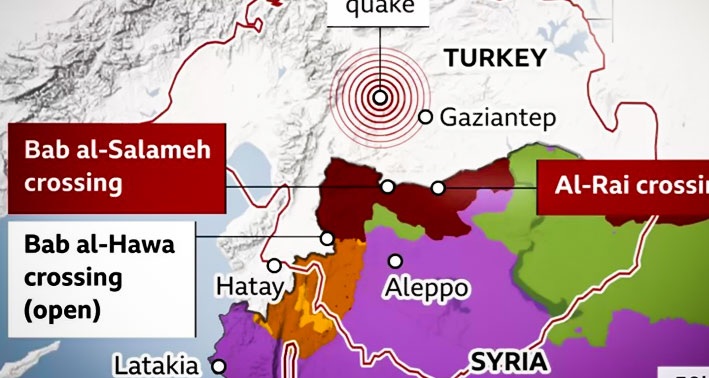Alwaght- In the days since the devastating earthquake that jolted Turkey and Syria and killed tens of thousands of people, international aid delivery to victims has been in the center of focus. Meanwhile, an important issue is the way of coordination of the foreign governments and organizations with a legal authority for better delivery of the aids.
Despite the Syrian overcoming of the 11-year crisis and recapture of a major part of the territories once lost to terrorist groups, the Western countries still insist on their failed claims that the Syrian government is illegitimate, something causing challenges to administration of President Bashar al-Assad for more effective distribution of the international aids to the affected people.
However, many other world governments and even the UN have declared the Syrian government as the main authority for coordination of humanitarian aids, and Damascus is committed to making the necessary arrangements and mobilizing its resources to accelerate the handling of the situation of the residents of Idlib province, which is under the control of terrorist and opposition forces. Due to the fact that the Idlib-based terrorists have been securing a large part of their resources and military equipment through the borders of Turkey in the past years, these borders are sensitive in terms of security for the Syrian government. Still, Damascus’s agreement to reopen the border crossings regardless of security concerns shows that the government is looking at all of the parts of the country equally and regardless of their political dispositions.
Driven by this approach, the Syrian government announced that it will fully reopen the two crossings of Bab al-Hawa and al-Rai in the northwest of country on the border with Turkey for an initial three-month period to facilitate timely delivery of humanitarian aid to the earthquake victims of Idlib. As the death toll from the February 6 earthquake continues to mount, the delivery of food, sanitation, food, protection, shelter, winter supplies and other critical supplies to millions of affected people is critical.
Idlib has become one of the most populated regions of Syria with the large population of refugees who have sought refuge in this province during the crisis years to escape the war, and due to the control of terrorist groups such as Tahrir al-Sham (formerly Jabhat al-Nusra) over the province, people live in dire straits economically and at the same time are barred by terrorists from moving to government-controlled areas.
Reopening these border crossings allows for access to humanitarian aids and faster visa issuance and easier travel. Bab al-Hawa has been the only communication channel for UN aid delivery to terrorist-controlled areas over the past 9 years. The UN Security Council resolution only allows the use of this border gate to send UN aid from Turkey to Syria’s northwest. All other international aids are planned to go through Damascus. Julien Barnes-Dacey, the director of the Middle East and North Africa Program at the European Council on Foreign Relations, said that there is a slim prospect for international aid delivery to northwestern Syria without Bab al-Hawa crossing.
“This will make a big difference,” Stephane Dujarric, a UN spokesman, told the BBC. “We are now using only one crossing, he continued, adding: “We hope that this agreement will last as long as we need to use it. We will use the crossing as soon as possible.”
As a result of the earthquake, many roads between Turkey and areas under the control of the Syrian opposition have been blocked. Aid organizations warn that more than a million people have been left homeless in Turkey, and this figure can be much higher in Syria.
Rescue teams in both countries are ending the rescue operations as the chances of recovering people alive are dwindling.
So far, more than 5,700 people have been killed in Syria by the earthquake. In Turkey, the number of victims has so far exceeded 31,000. Many Syrians have been angry at the inadequacy of aids delivered to their war-torn country.
Although the Westerners claim that the sanctions do not affect humanitarian aid, the Syrian government still considers the sanctions to be the most important factor blocking the arrival of sufficient international aid to the country and the causing government’s problems in dealing with the situation.
On Monday, the representative of the Syrian government, Basam al-Sabbagh, in a speech at the UN, called for the lifting Western sanctions against Syria, adding that they hinder the delivery of aids.
As the rescue operations continue, some allied and friendly countries, such as Iran and Russia, send aid directly to Damascus. So far, Iran has sent seven planes carrying humanitarian aid to Syria. In this connection, the Consul General of the Islamic Republic of Iran in Aleppo Salman Nawab Nouri announced in an interview with IRNA on Monday evening that the third shipment of humanitarian aid from Iran was sent to Aleppo by a cargo plane.
“This plane carried 30 tons of food and baby formula, which will be distributed based on the severe needs of the victims in the earthquake-affected areas,” he said.
Before this, two air shipments of aids were delivered to Damascus, two to Latakia, and two more to Aleppo. With the arrival of the new plane to Aleppo, the number of planes delivering aids to Syrian victims reached seven.
The Iranian aids suggest that, indeed, air aids can be way faster and in large amounts help the Syrian victims and the UN and other countries should stop politicization of the relief operations and take similar steps in cooperation with the central government for a more serious role in easing the people’s suffering.



























